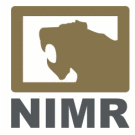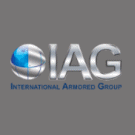|
|
|||
|
Defense & Security News - South Korea
|
|||
|
|
|||
|
South Korea will continue to develop and strenghten defense collaboration with United States.
|
|||
|
Ministry of National Defense (MND) of South Korea has selected international defense cooperation as one of its 4 defense priorities and been dedicated to enhancing the ‘World-wide Korean Army’ status. Not only has it solidified the relationship with the U.S., our largest ally, but has also worked on continuous exchanges and cooperation with surrounding nations which have an influence on the situation around the Korean Peninsula.
|
|||
|
|
|||
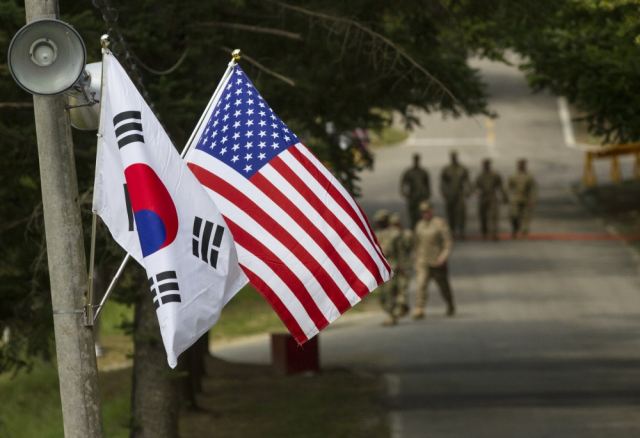 The South Korean and American flags fly next to each other at Yongin, South Korea, Aug. 23, 2016. (U.S. Army photo by Staff Sgt. Ken Scar) The South Korean and American flags fly next to each other at Yongin, South Korea, Aug. 23, 2016. (U.S. Army photo by Staff Sgt. Ken Scar) |
|||
|
|
|||
|
Korea-U.S. alliance that has been continuously nurtured since the 6·25 Korean War is a precious asset that ensures safety around the Korean Peninsula. Our two nations have developed a comprehensive strategic alliance based on a firm military alliance. The MND has been developing the already-planned wartime operational control handover, while continuing discussions with the U.S. for its systematic promotion of wartime operational control handover. As well, regular evaluations and complementation conducted by a new combined implementation and supervision system are also ongoing. The MND is promoting phased measures for developing our military’s combined defense leading ability. Last February, it published and distributed an ‘overall promotion plan’ by unit and its detailed promotion road maps, and made it regularized and institutionalized, reflecting major promotional projects for mid/long-term progress-based construction on planning, programing documents. |
|||
|
|
|||
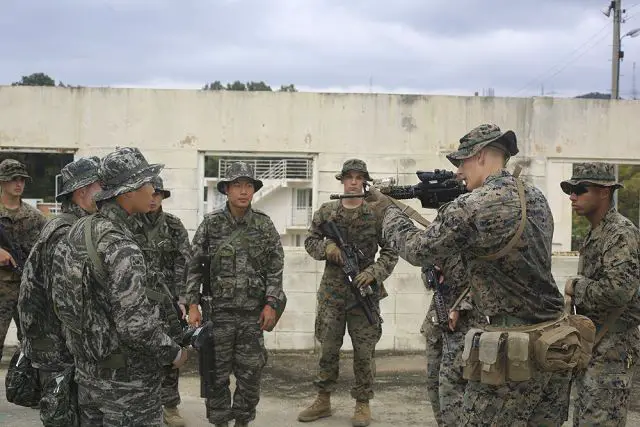 U.S. Marines with Lima Company, 3rd Battalion 2nd Marines demonstrates room clearing drills for Republic of Korea (ROK) Marines with 2nd Company, 31st Battalion 1st Marines during Exercise Hoguk outside of Pohang, South Korea, October 20, 2016. U.S. Marines with Lima Company, 3rd Battalion 2nd Marines demonstrates room clearing drills for Republic of Korea (ROK) Marines with 2nd Company, 31st Battalion 1st Marines during Exercise Hoguk outside of Pohang, South Korea, October 20, 2016. |
|||
|
|
|||
|
Efforts to maintain the peace and stability of the Korean Peninsula are continuing through defense exchange cooperation with surrounding countries. The General Security of Military Information Agreement, which was concluded with Japan last November, is representative of these efforts. The MND plans to fill the information gaps on North Korea by using the intelligence capabilities of Japan, a country with a higher defense budget than ours and qualitatively and quantitatively superior surveillance and detection assets.
Through strategic communication efforts with China and Russia, Korea has been trying to induce their participation in the UN sanctions against North Korea and gain support for our policy towards Communication channels between Korea-China and Korea-Russia have been invigorated for strategic communication and extension of exchange. In addition, the MND has actively attended multilateral security councils including the Asia Security Council, Halifax International Security Forum, etc. to explain our policy regarding North Korea and induce other countries to support us. Korea will expand its role in pending international security issues by co-chairing the Maritime Security subcommittee under ASEAN Defense Ministers' Meeting-Plus (ADMM-Plus) from next year to 2020. South Korea military has constantly contributed to the international community through overseas dispatch activities. South Korea has dispatched 1,100 troops of 4 units; Hanbit, Dongmyeong, Cheonghae and Arc units. It made a contribution to world peace and strengthening our national status. PKO unit has been well received by the UN, local military headquarters and host nations, and requested continuous dispatching. And as a good outcome of the mission capability and education system highly appreciated by the UN, the contribution pledge of dispatching engineer corps is being managed as Grade 2 in the structure of the UN’s contribution management pledge. |
|||
|
|
|||
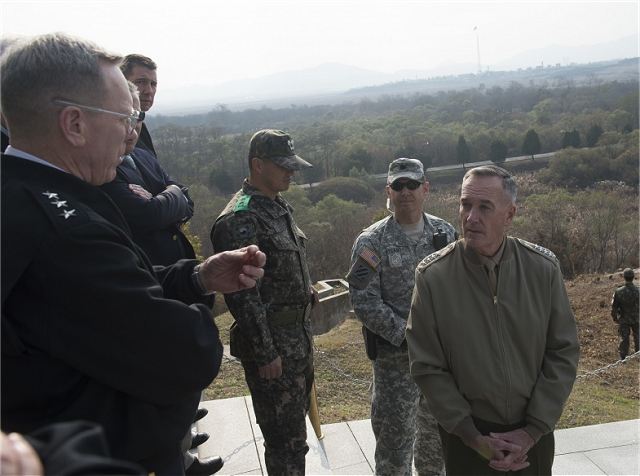 Marine Corps Gen. Joseph F. Dunford Jr., 19th chairman of the Joint Chiefs of Staff, is briefed by U.S. Army Lt. Gen. Bernie Champoux, commanding general 8th U.S. Army/ Chief of Staff United Nations command, and U.S. Army Col. James Minnich, secretary of the United Nations Command Military Armistice Commission, during his visit to the Demilitarized Zone in the Republic of Korea, Nov. 2, 2015 (DoD photo by Navy Petty Officer 2nd Class Dominique A. Pineiro) Marine Corps Gen. Joseph F. Dunford Jr., 19th chairman of the Joint Chiefs of Staff, is briefed by U.S. Army Lt. Gen. Bernie Champoux, commanding general 8th U.S. Army/ Chief of Staff United Nations command, and U.S. Army Col. James Minnich, secretary of the United Nations Command Military Armistice Commission, during his visit to the Demilitarized Zone in the Republic of Korea, Nov. 2, 2015 (DoD photo by Navy Petty Officer 2nd Class Dominique A. Pineiro) |
|||
South Korea will continue to develop and strenghten defense collaboration with United States 12801173
- Posted On










